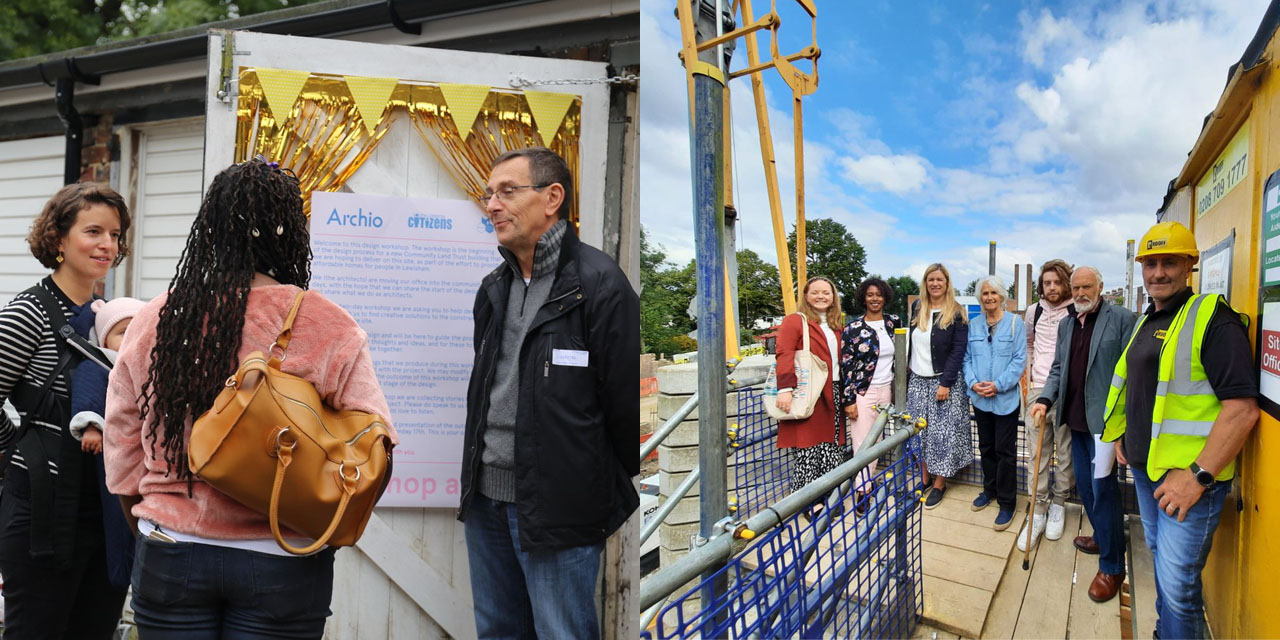The Rural Urban Synthesis Society (RUSS) is a CLT with the aim of creating sustainable community-led neighbourhoods with affordable housing. The ambitious Church Grove scheme of 36 homes offers self-build opportunities for local people.
| Number of homes | 36 affordable units at a range of levels |
| Location | Ladywell |
| Built | 2024 |
How they formed
The founding chair drew on his experience of growing up on Walters Way and living in Sanford Co-op, to gather a community of supporters and raise funds to incorporate a Community Benefit Society in 2009. They built membership, giving anyone the opportunity to become a member of RUSS by buying a £1 share which gives them a vote on the decision making board. Individuals can buy more shares but do not receive more votes. RUSS have an active membership with over 1000 members, running education and outreach programmes. The level of organisation has also grown significantly, hiring consultants and employing staff, while continuing to be volunteer-run and maintaining open member meetings.
Site
The group became aware of a vacant site, which had previously been used as a special needs primary school, at Church Grove in 2013 and asked the Council to consider a community-led self-build project. The Council eventually sought a non-profit community-led development partner through an OJEU process which prioritised proposals for their affordability and approach to community involvement. RUSS Community Land Trust (CLT) were selected to enter into a development agreement and 250 year lease in 2016. This arrangement gives the council certainty that the scheme is legally bound to delivering these social outcomes, which gave confidence to take less than best consideration for the site thereby allowing homes to be more affordable than others in the area, whilst their affordability will be protected in perpetuity by the Community Land Trust.
Finance
RUSS received an early stage grant from the GLA to develop their proposals and hire consultants. A loan form CAF Venturesome funded planning permission, and RUSS worked with Triodos Corporate Finance to set out a viable budget and cash flow forecast. The construction of the homes were financed with GLA capital grant and loans from a mixture of social investors and banks, which will be repaid in part by the residents buying shared equity and shared ownership homes with individual mortgages. A long-term loan will be required to cover the remainder which will be paid for by rental income from shared ownership homes. Grant requirements for the rented flats meant they had to be owned by a Registered Provider (RP). Although RUSS have ambitions to become an RP, they entered a partnership with CDS Co-operatives who purchased the flats to act as landlord, as well as providing management and maintenance services across the wider scheme. Resident assessments were carried out by the Parity Trust, a charity who helps people on low incomes into home ownership. They assessed proposed residents’ needs with their ability to raise a deposit and ensure they can sustain mortgage repayments or rent along with bills, service charges and council tax. The resale price of the flats is decoupled from the property market and linked to inflation.
Design and Construction
A guiding principle for the organisation is that residents should be involved in the design and construction of the project and create opportunities for project management and construction training. Prospective residents were selected early on in the process through a random ballot of members, resulting in a mixed community. After dealing with issues of contamination and flood risk, RUSS received planning permission in 2018, but had to get another permission when changes were needed to construction materials and approach. This increased the number of affordable homes on the site to 36, ranging from one to four bedroom properties as well as a guest suite, office and laundry room. Sustainability was another big driver, and the scheme includes a novel solar powered heat pump arrangement to provide hot water to flats. Construction started in 2021 and took just over 2 years, and several of the prospective residents completed the plumbing and internal walls and finishes of their homes, leading to flats unlike most new-builds.
In parallel to the main scheme they also crowdfunded for a self-build community space which will become a sustainable construction demonstration project, and a home for the RUSS School of Community Led Housing running workshops to pass on their acquired knowledge to others looking to start their own community led housing projects. The space includes a small kitchen and can accommodate community meetings, performances, and children’s playgroups.
Read about the project in The Guardian
